Economic Justice
Ken and Meredith Williams have been waiting 79 days for the Bank of America in Georgia to close on their home loan.
The bank has delayed the closing three times. And the Williams, who live outside Atlanta and want to buy a modest home in the city nearer to their work offices, have grown frustrated with the hold-up and ... clever couple that they are ... their ire turned to humor.
They started a blog chronicling their misadventures with the banking behemoth, created a Twitter account to bombard the bank with message through it's @BoA_Help account, and then made a music video — Ken plays the guitar and sings while Meredith, in one scene, dances in the background in the parking lot of the Bank of America branch in Lawrenceville, Ga.
It's hilarious and, they hope, effective.
See the video and read the Williams' tale of woe inside...
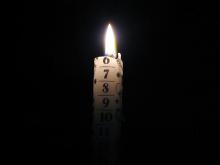

I’d like to share some Advent reflections from my former professor at North Park University, Scot McKnight. He is in the midst of a series that points to what Advent is supposed to remind Christians of. It’s a simple message with deep meaning: Jesus is King.
Where in the world is the Golden Calf?
Remember that huge golden replica of the Wall Street Bull that led the faithful of New York to Zuccotti Park a couple months ago? Well, it’s back! And this time the iconic sculpture is serving as more than spectacle.
Members of Catholics United, along with faith leaders and residents of Occupy DC, marched with the Golden Calf from McPherson Square to the Capitol on Thursday to deliver a petition in support of a bill that would raise taxes on the rich.
“If we’re really concerned with the ‘least’ of our brothers and sisters, then cutting their resources isn’t the way to do it,” said Jason Miller, one of the artists who worked on the Calf and a member of Catholics United. “We need to get rid of the deficit, but not on the backs of the poor.”
The U.S. Conference of Catholic Bishops (USCCB) released a letter to Congress on Monday concerning unemployment benefits. Bishop Stephen E. Blaire of Toledo, Ohio, the letter's signatory, makes the argument that unemployment benefits are a “right to life” or pro-life issue.
This is a time of “prolonged and pervasive economic pain.” The letter cites the median length of joblessness as 10 months and that there are 4 job seekers for every 1 job opening. Blaire then quotes from Pope John Paul II’s encyclical Laborem Exercens:
The obligation to provide unemployment benefits, that is to say, the duty to make suitable grants indispensable for the subsistence of unemployed workers and their families, is a duty springing from the fundamental principle of . . . the right to life and subsistence.
If Glenn Beck still had that black board, Pope John Paul II might end up receiving the posthumous honor of having a smiling photo added to it.

Your neighbor is every man woman and child who touched the supply chain used to make your cell phone, used to make the clothes you wear, the computers you type on and the cars you drive.
Your neighbors are all of God’s children. The theological reality that people of faith try to live out is that our neighbor is not defined by geographical proximity. Our neighbor is the person in need.
Sometimes, caring for our neighbor means a change of plans. Sometimes, caring for our neighbor means we have to slow down a little bit. Sometimes, caring for our neighbor might even cost us money.
There are people who haven’t wanted to get involved in the mess by the side of the road. They walk by it and say that it’s somebody elses responsibility. My job, they say, is at the end of the road at Jericho. I’m just being faithful to my shareholders by maximizing profit. My job is just getting the products people want into the hands of those that want them. I can’t be worried about those who get left by the side of the road of my supply chain. If I stop to help clean up the mess along the way it might cost time and money.
There has been a lot of anger levied at the very wealthy since the Occupy movement began back in September. There is no doubt that much of this anger is justified – righteous indignation, if you will.
The ways that people have become extremely wealthy have often been corrupt or immoral, whether or not they are technically "legal." Part of the reason that the Occupy movement sprang up was because people felt that there were different rules for "us and them." People who lost millions of dollars in what was effectively high-stakes gambling were pardoned with little more than a slap on the wrist, while regular families lost everything in a crisis they had no hand in.
As I say, there has been, and still is, much anger. But out of that anger must come something new, something tangible and real.

Pepper spray.
Those two words bring to mind two very contrasting images from recent headline news: One is the shocking image of University of California at Davis students seated on a pathway, arms linked in peaceful protest, as they are repeatedly doused with pepper spray by a zealous campus police officer. The other is of the equally zealous shopper on Black Friday who sprayed her fellow Walmart customers so she could buy a discounted X-Box.
On the one hand we have an image of the power of nonviolent protest to expose injustice, and on the other an appalling image of consumer greed.
These are the signs of our times.
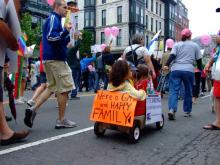
Failure to provide equal rights for LGBT people doesn’t just hurt those who are gay or lesbian, it also hurts the nearly 2 million children who now live in LGBT households.
Contrary to many stereotypes, children living in LGBT households are 50 percent more likely to live in poverty than those living in heterosexual households. Societal prejudice and discriminatory policies both have something to do with it. A recent report sponsored by the Movement Advancement Project, Family Equality Council and the Center for American Progress, explains why.

On Nov. 30, at Gordon College in Wenham, Mass., Sojourners CEO Jim Wallis and Arthur Brooks of the American Enterprise Institute, debated the question, "Is Free Enterprise Moral?"
The event was sponsored by the Center for Christian Studies and the Jerusalem and Athens Forum at Gordon as part of the college's ongoing "Faith Seeking Understanding" lecture series.
Watch complete video of the debate inside...
I would never have been mistaken as a political supporter of President George W. Bush. But in his early days as president, I was invited to have conversations with him and his team about faith-based initiatives aimed at overcoming poverty, shoring up international aid and development for the most vulnerable, and supporting critical agendas such as international adoptions of marginalized children and the broken domestic foster care system.
My invitations to the Bush White House ended when I strongly and publicly opposed the Iraq War. But I continued to support the administration’s efforts to combat poverty and disease, especially Bush’s leadership in combating HIV/AIDs, malaria, and massive hunger in the poorest places in Africa.
That agenda was called “compassionate conservatism” and I was grateful for it. Back then, Republican leaders could be fiscally conservative, favor “small government,” and believe in the free market, for example, but also believe that government should and must partner with the private sector — especially non-profit and faith-based organizations — to help lift people out of poverty, both abroad in the developing world and here at home in the richest nation on the planet. Such a conviction requires two things: A genuine empathy and commitment to the poor, and a more balanced and positive view of government — neither of which were much evident in the GOP’s right-wing quarters, where the compassionate conservative agenda was opposed by party leaders such as Tom DeLay and Dick Armey.
I met people like Mike Gerson, who was then George Bush’s chief speech writer and a policy advisor, and is now a columnist for the Washington Post. I was told it was Gerson and the Bush himself who often were the ones to stand up for the compassionate conservative vision at Oval Office meetings.
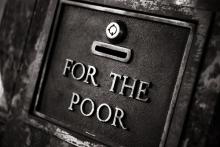
The 99 percent offers work and wealth
to the commons
with blessing and prayer.
In return
schools, fire stations, police officers,
Medicare, Social Security, and Food Stamps
Are snatched from open hands.

*Warning: SANTA SECRETS AHEAD. Shoo the children.*
In rough economic times such as these, we try extra hard to get the kids in our lives a little something special for Christmas. We may have to tighten our belt to the “painful” notch, but it’s worth it for the face you get in return for the Tickle Me Elmo, or the ZuZu pet, or whatever it is this year.
But what about Santa? Does he have a budget? He certainly has a belt, but does it get tightened in harsh (let’s not say LEAN) times? Maybe Santa could stand to lose a few…
Well, according to Fred Honerkamp, Old Saint Knick understands your finances.

This is so horrendous it's almost too awful to type.
Early this morning at a welfare office in Laredo, Texas, a mother, desperate after months of being denied food stamps for her family, pulled a gun and shot her two young children, before killing herself.
Finding connections between the past, present, and future at Occupy Wall Street.
How blind commitment to 'free trade' throws working people under the bus.
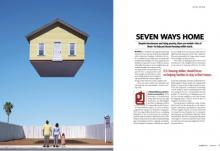
Despite foreclosures and rising poverty, there are models -- lots of them -- to help put decent housing within reach.
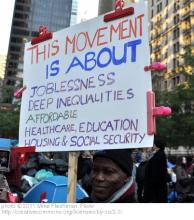
I was also struck by their refusal to simply announce a set of demands. Occupiers aren’t dumb—they’ve read and heard the many calls from the media and politicians that they simply say what they want. It would be easy enough—but in some sense it would detract from the greatest usefulness of the campaign, which has been to articulate a sense of despair bordering on rage. Because they didn’t quickly say “we want this bill passed,” commentators have had to grapple with the actual message of many Occupiers: Our economy is unfair. It gives too much power to corporations who abuse that power for their own ends. They’ve not just cheated us financially; they’ve cheated us of our democracy.
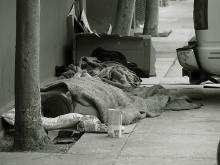
This weekend, 60 Minutes aired a piece that has been commended by many as a shocking but must-see insight into poverty in the United States today.
Sixteen million children now live in poverty, and for many, they don’t even have a proper place to call home. These situations are even more frequent in areas of the country where traditional industries have collapsed in the wake of the financial crisis – such as the construction industry in central Florida.